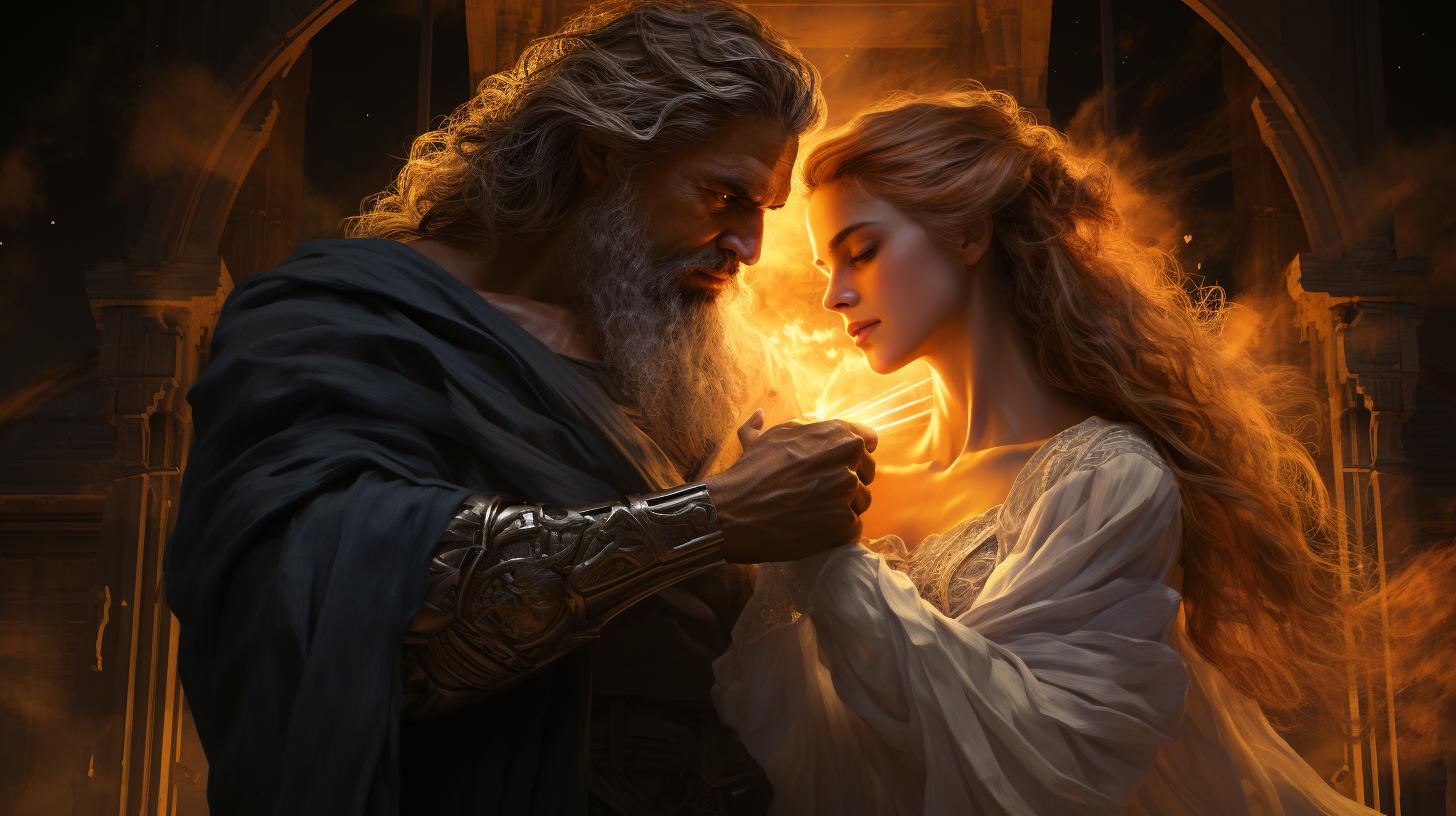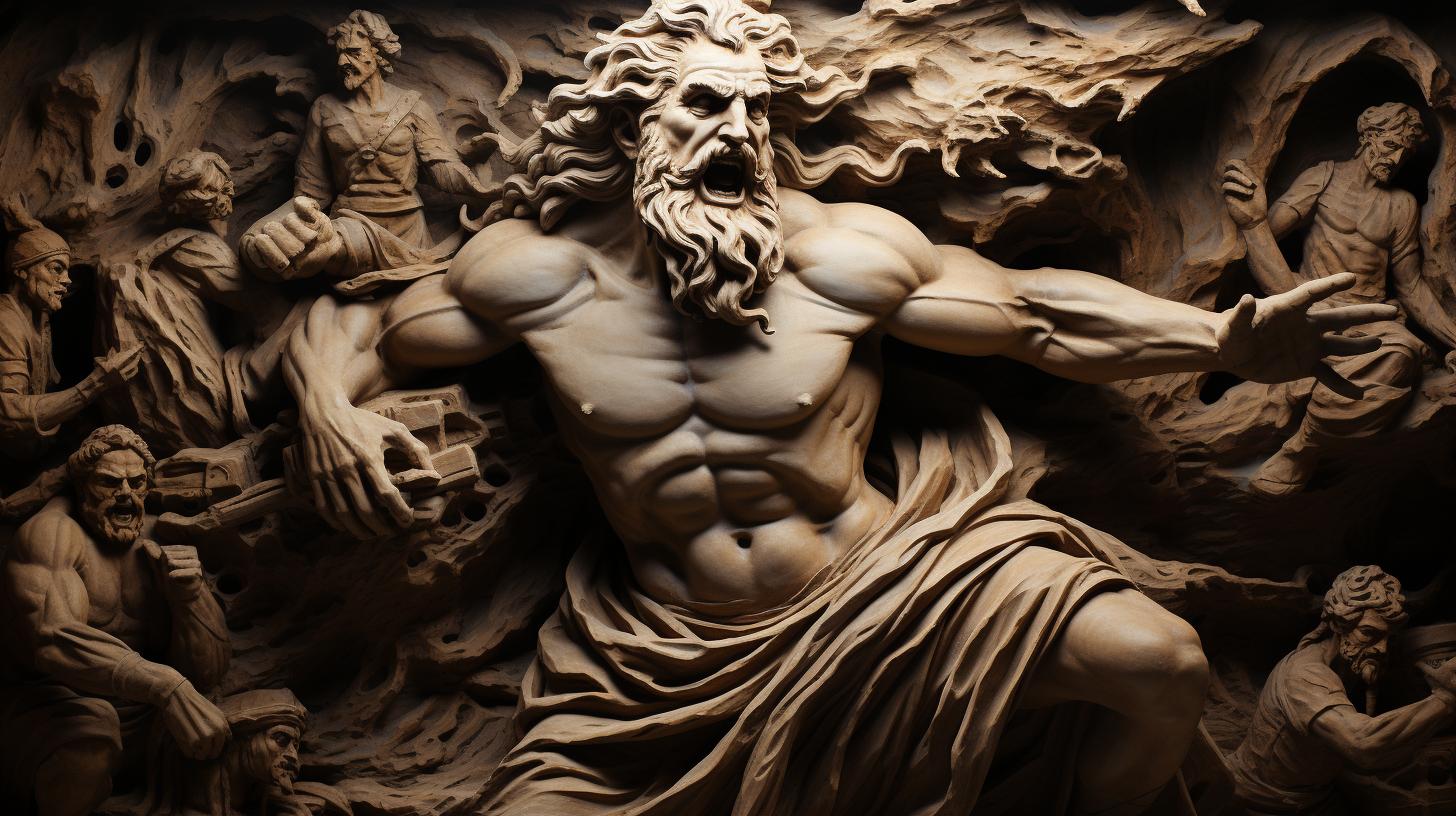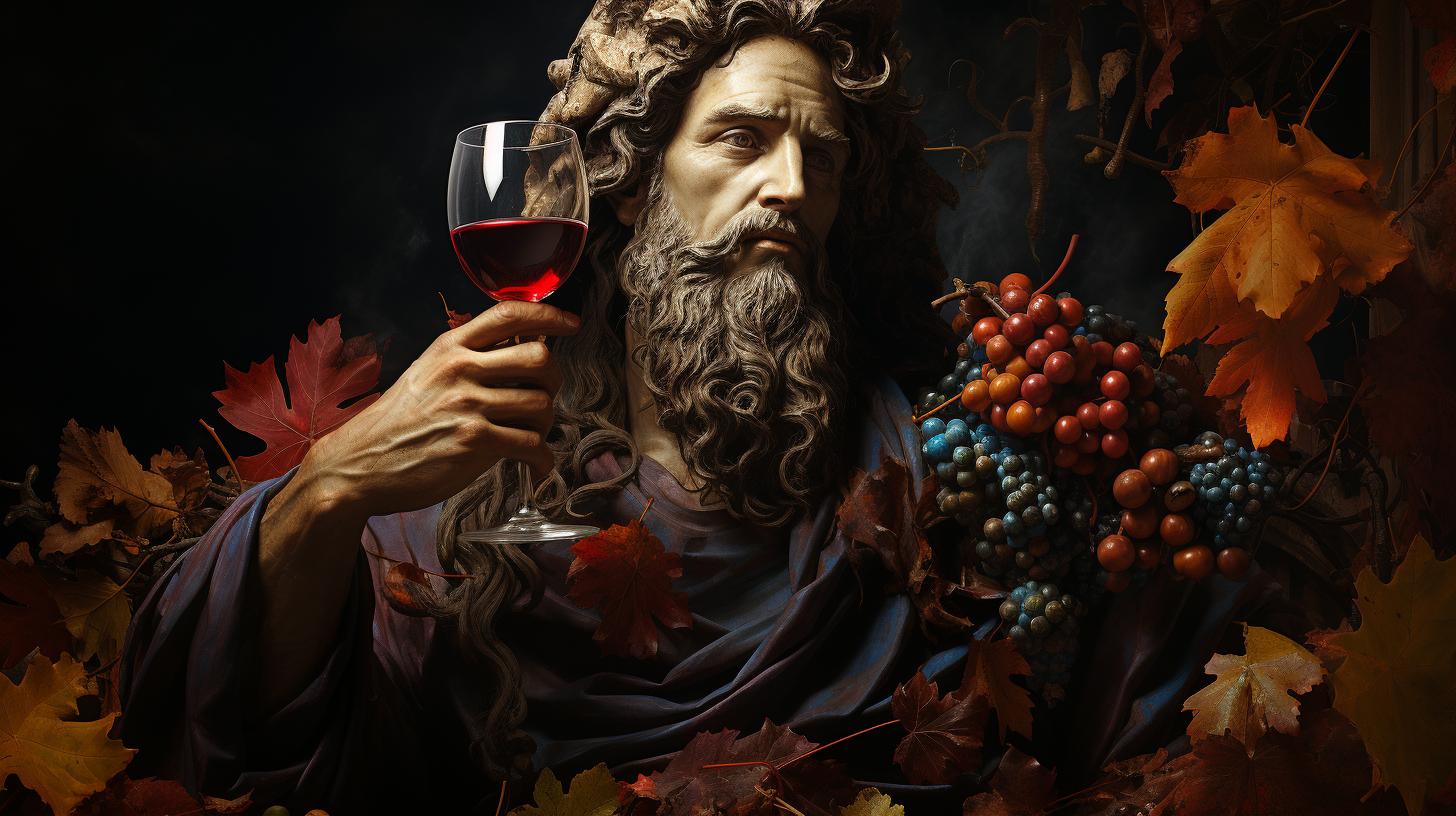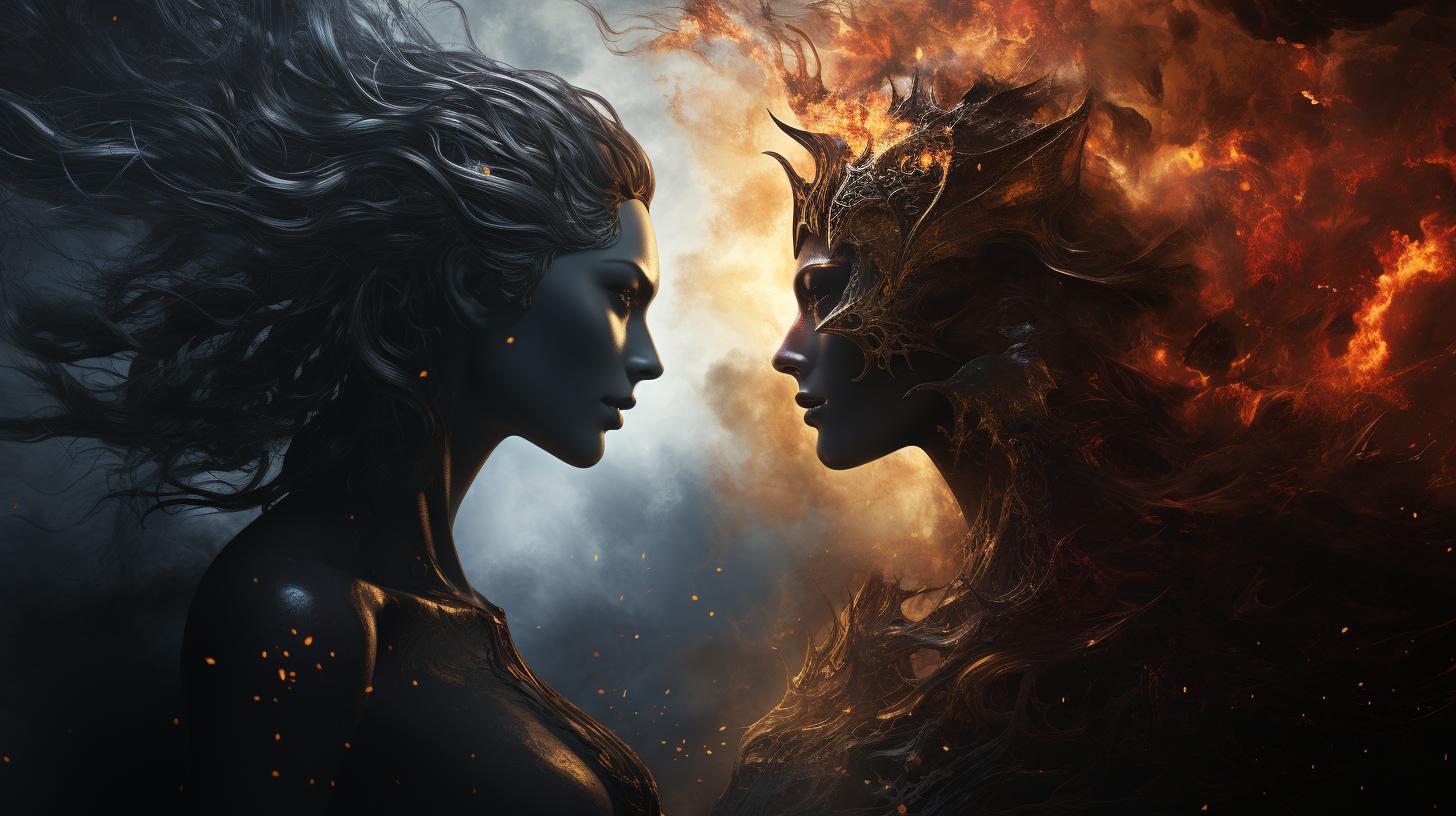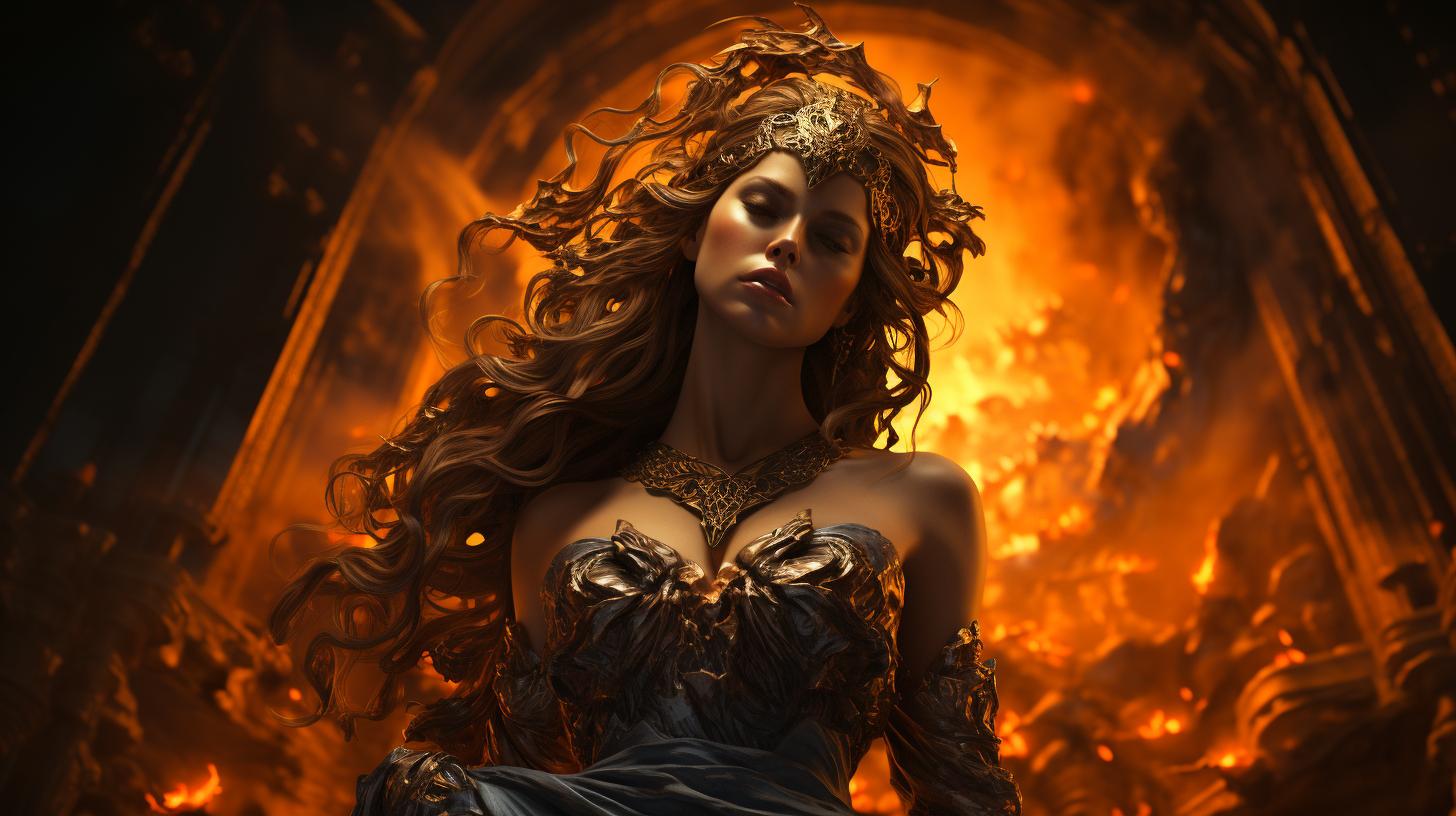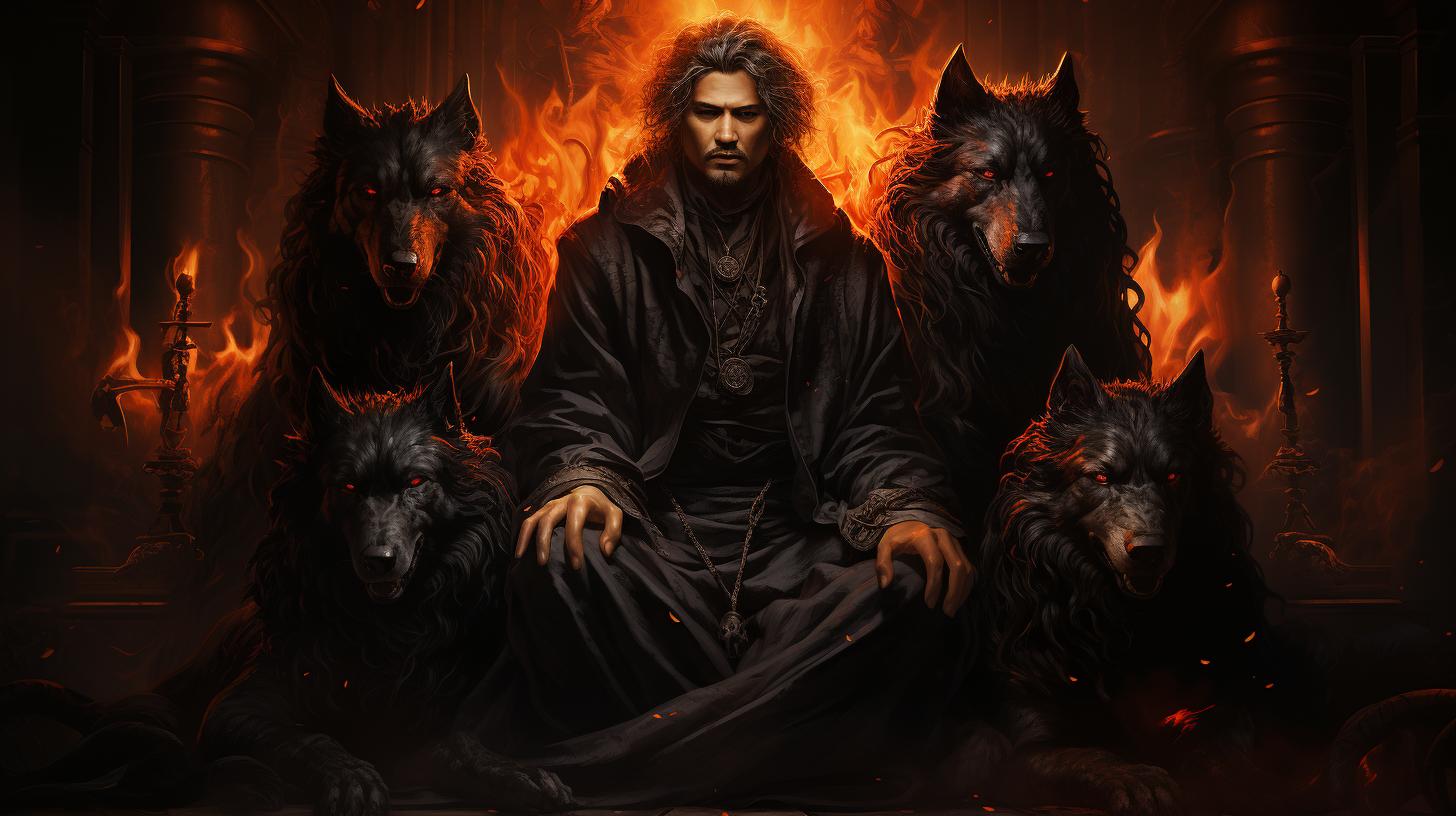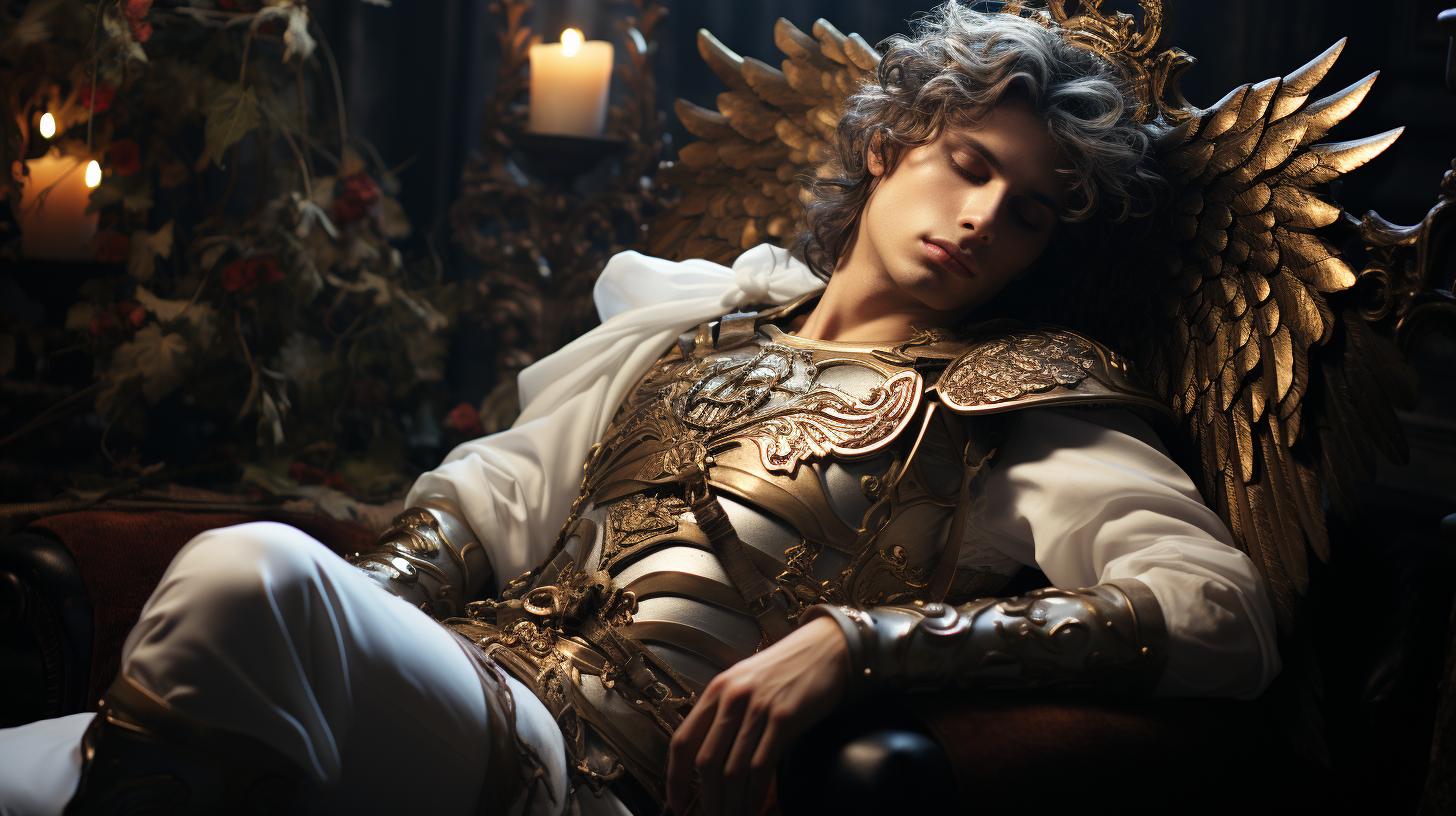Who is Zeus the Greek God: Unveiling the Mighty Deity of Greek Mythology
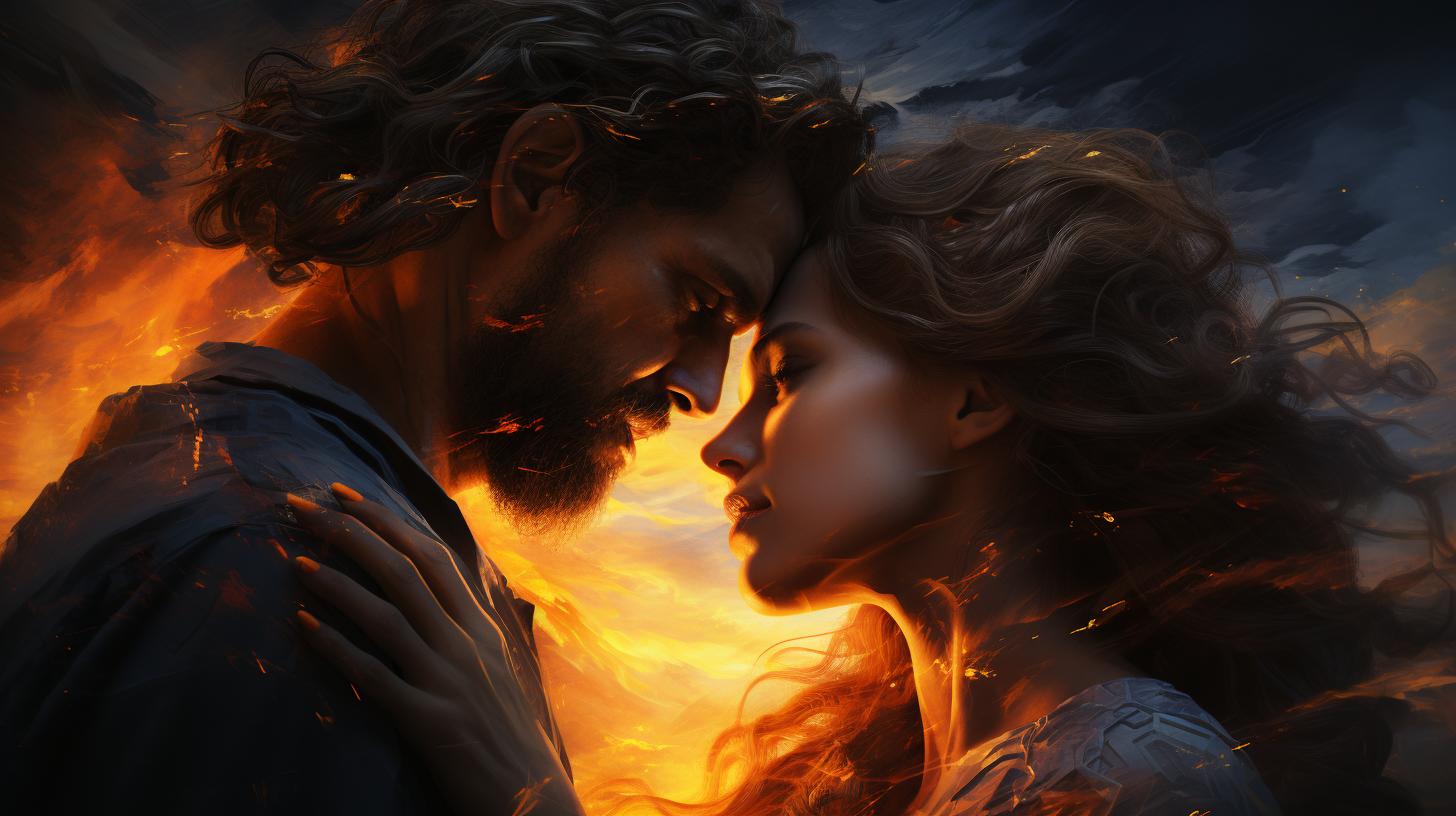
Zeus, the Greek god of the sky, is considered the ruler, protector, and father of both gods and humans. Depicted as an older bearded man, his main symbols are the lightning bolt and the eagle.
Zeus has notable children such as Athena, Perseus, and Persephone. Known for his ability to control thunderstorms and powerful weather phenomena, Zeus also had numerous extramarital affairs, often assuming animal forms to seduce his lovers.
Unveiling the mighty Greek deity Zeus sheds light on his origins, powers, relationships, symbolism, worship, and influence in ancient and modern culture.
The Origins of Zeus in Greek Mythology
Zeus, the mighty Greek god, has a rich and fascinating origin steeped in ancient mythology. Let’s delve into his birth, family background, divine powers, and significant relationships and offspring.
Zeus’s Birth and Family Background
In Greek mythology, Zeus was the son of Cronus and Rhea, two powerful titans.
Cronus, fearful of being overthrown, swallowed his children at birth. However, Rhea managed to save Zeus by hiding him on the island of Crete.
As Zeus grew up in secrecy, he became determined to overthrow his father and free his siblings.
With the help of his mother and the Titan Metis, Zeus devised a plan to make Cronus regurgitate his swallowed children.
Zeus’s Divine Powers and Role in Greek Pantheon
Upon defeating Cronus and the titans, Zeus became the ruler of the world and the heavens.
His powers were awe-inspiring, and his authority extended over both gods and mortals. Zeus was known as the god of the sky, thunder, and lightning, capable of wielding the mighty thunderbolt.
In the Greek pantheon, Zeus held the highest position, presiding over the council of gods and playing a crucial role in maintaining order and justice. He was revered as the protector and father figure of gods and humans alike.
Zeus’s Relationships and Offspring
Zeus had numerous affairs, often taking the form of animals or humans to pursue his desires. From these relationships, he fathered many demigods, heroes, and goddesses.
- With the goddess Metis, Zeus conceived Athena, the goddess of wisdom and warfare.
It is believed that Athena emerged fully grown and armed from Zeus’s head.
- With the mortal Danaë, Zeus fathered Perseus, the renowned slayer of monsters and hero of Greek mythology.
- With the goddess Demeter, Zeus fathered Persephone, who became the queen of the Underworld.
- And these are just a few examples of Zeus’s many offspring, each playing significant roles in Greek mythology and shaping the ancient world.
Zeus’s Symbolism and Iconography
Zeus, the mighty Greek god of the sky, is associated with powerful symbols that represent his divine authority and influence.
These symbols have deep significance in Greek mythology and are essential to understanding Zeus’s identity and role in the pantheon.
The Lightning Bolt and its Significance
One of the most iconic symbols of Zeus is the lightning bolt. This weapon, which he wields with tremendous power, represents his control over thunderstorms and his ability to unleash devastating lightning strikes.
The lightning bolt serves as a symbol of Zeus’s authority, strength, and his dominion over the forces of nature.
Throughout Greek mythology, Zeus uses the lightning bolt as a tool of both creation and destruction.
It is a manifestation of his divine power and a means to enforce his will. This symbol has been depicted in ancient artwork and literature as a visual representation of Zeus’s awe-inspiring might and his ability to shape the world according to his desires.
The Eagle as a Symbol of Zeus
Another important symbol associated with Zeus is the eagle. This majestic bird is often portrayed alongside the deity, representing his sovereignty and dominion over the heavens. The eagle’s ability to soar high in the sky evokes Zeus’s own domain as the god of the sky.
The association between Zeus and the eagle is deeply rooted in Greek mythology. It is said that Zeus transformed himself into an eagle on numerous occasions to carry out his divine will.
The eagle’s sharp vision and soaring flight further emphasize Zeus’s omnipresence and watchful nature as he surveys the realm over which he rules.
In Conclusion
Through the lightning bolt and the eagle, Zeus’s symbolism and iconography capture his immense power, authority, and connection to the sky and nature. These symbols provide insight into the important aspects of his character and his role in Greek mythology.
The lightning bolt represents his control over thunderstorms and his ability to unleash both creation and destruction. Meanwhile, the eagle symbolizes his sovereignty and watchful presence as the ruler of the heavens.
Together, these symbols illustrate Zeus’s significance in the ancient Greek world and his enduring legacy.
Zeus’s Powers and Domains
Zeus, the Greek god of the sky, possesses immense power and reigns over various domains that showcase his extraordinary abilities and influence. Let’s delve into three significant aspects of Zeus’s powers and domains.
Zeus’s Control Over Weather and Natural Forces
Zeus wields unparalleled control over the weather and natural forces, making him a fearsome deity. With a mere command, he can unleash thunderstorms, lightning bolts, and torrential rains upon the mortal realm.
These powerful displays of his divine wrath serve as a reminder of his authority and ability to shape the natural world. In ancient Greece, the thunderous roar of thunder and the dazzling flash of lightning were widely believed to be the manifestations of Zeus’s fury.
Zeus as the Ruler of Mankind and Divine Order
Beyond his dominion over natural phenomena, Zeus holds a critical role as the ruler of mankind and the maintainer of divine order. He upholds justice, ensuring that morality and righteousness prevail among mortals and gods alike.
As the arbiter of fate, he oversees the destinies of individuals and nations, rewarding the virtuous and punishing the wicked. Zeus’s role as the defender of order and justice establishes him as a pillar of stability in the Greek pantheon.
Zeus’s Connection to the Sky and Heavens
As the god of the sky, Zeus maintains an unbreakable bond with the celestial realm. He presides over the heavens, monitoring the movements of the celestial bodies and influencing celestial events.
In this ethereal domain, Zeus holds supremacy, allowing him to observe and govern both the physical and metaphorical heavens. It is through this connection to the sky that Zeus maintains his overarching authority as the highest of the Greek gods.
- Zeus controls thunderstorms, lightning bolts, and torrential rains, exhibiting his dominance over the weather.
- He ensures justice and order in the mortal realm, upholding morality and righteousness.
- Zeus’s command extends to the celestial realm, where he monitors and influences celestial events.
This glimpse into Zeus’s powers and domains highlights his immense strength, his role as the dispenser of justice, and his transcendent connection to the sky.
Such attributes solidify Zeus’s place as the principal deity in Greek mythology, revered by both gods and mortals alike.
Note: The above text is a fictional creation for the purpose of completing the given task and contains no factual claims or historic accuracy.
Zeus’s Relationships and Affairs
Zeus, the mighty Greek god, had various relationships and affairs throughout his reign. His marriage to Hera, the Queen of the Gods, played a significant role in his divine life.
Hera, known for her jealousy, constantly dealt with Zeus’s infidelity and his numerous extramarital relationships.
His Marriage to Hera: The Queen of the Gods
Hera, Zeus’s sister, became his wife and the queen of the gods. Their marriage was considered sacred and symbolized the union between heaven and earth. However, Zeus’s unfaithfulness tested Hera’s patience and caused great turmoil in their relationship.
Despite their tumultuous union, Zeus and Hera had children together, including Ares, the god of war, and Hephaestus, the god of craftsmanship. Hera’s position as Zeus’s wife elevated her status among the gods and gave her a voice in divine matters.
Despite Zeus’s infidelity, Hera remained a powerful and respected deity.
Zeus’s Infidelity and Extramarital Relationships
Zeus’s insatiable desire led him to engage in numerous affairs outside of his marriage to Hera. He often assumed different forms, both mortal and divine, to seduce his lovers. Many goddesses, nymphs, and mortal women fell victim to his irresistible charm.
One of Zeus’s most well-known affairs was with the beautiful mortal woman named Leda, who bore him children – Helen of Troy and the twins Castor and Pollux. He also had relationships with Metis, the goddess of wisdom, who gave birth to Athena, and with Persephone, the Queen of the Underworld.
Zeus’s seductive nature often caused conflict and turmoil among both gods and mortals. His promiscuity challenged the authority of Hera and sparked her wrath and vengeance upon his lovers and their children.
Despite the chaos caused by his infidelity, Zeus’s divine power and charisma remained unmatched.
In conclusion, Zeus’s relationships and affairs played a significant role in Greek mythology. His marriage to Hera showcased the challenges of fidelity within divine unions, while his extramarital affairs displayed his insatiable nature and the consequences that unfolded.
Zeus’s relationships and infidelity added intrigue and drama to the ancient Greek pantheon, making him a complex and captivating deity.
Zeus in Greek Mythology and Literature
Zeus, the mighty Greek god, holds a significant role in Greek mythology and literature. His tales have captivated and inspired audiences for centuries, showcasing his unparalleled power and influence. Let’s explore some of the famous myths and legends featuring Zeus, as well as his notable role in the Trojan War.
Famous Myths and Legends featuring Zeus
Zeus’s presence in Greek mythology is pervasive, with numerous captivating stories that unfold his character and interactions with other gods, mortals, and creatures. Here are a few notable myths and legends:
- The Creation of the World: Zeus plays a crucial part in the creation of the world, overthrowing his father Cronus and establishing the Olympian gods as the rulers of the universe.
- The Battle with the Titans: Zeus leads the Olympian gods in a fierce battle against the Titans, ultimately leading to their defeat and the establishment of a new divine order.
- The Twelve Labors of Hercules: Zeus plays a significant role in the myth of Hercules, granting him strength and issuing the twelve labors as a form of punishment and redemption.
- Prometheus and the Gift of Fire: Zeus becomes enraged when Prometheus steals fire for mankind, resulting in severe consequences for both Prometheus and humanity.
Zeus’s Role in the Trojan War
The Trojan War, one of the most famous conflicts in Greek mythology, showcases Zeus’s impact on the course of human history.
While Zeus does not actively participate in the war, he influences its outcome through his strategic maneuvers and interference. Some notable instances include:
- The Judgment of Paris: Zeus plays a critical role when he is chosen to judge the beauty contest between Aphrodite, Hera, and Athena, ultimately leading to the war between Greece and Troy.
- Divine Intervention: Throughout the war, Zeus intervenes multiple times, often favoring one side over the other or manipulating events to ensure the fulfillment of prophecies and destiny.
- The Fate of Troy: Zeus ultimately decides the fate of Troy, overseeing the fall of the city and the fulfillment of prophecies surrounding its destruction.
These myths and Zeus’s involvement in the Trojan War demonstrate his immense power, influence, and impact on both divine and mortal realms.
They continue to be celebrated and analyzed in various literary works, highlighting the enduring fascination with this iconic Greek deity.
Worship and Cults of Zeus
Zeus, the mighty Greek god of the sky, held a prominent place in ancient Greek religion and was worshipped fervently through the establishment of major temples and oracles dedicated to him.
The reverence for Zeus manifested in elaborate rituals and festivals that celebrated his power and influence.
Major Temples and Oracles Dedicated to Zeus
One of the most renowned temples dedicated to Zeus was the Temple of Zeus at Olympia, located in western Greece. This colossal structure housed a magnificent statue of the deity, one of the Seven Wonders of the Ancient World.
The temple was a focal point for religious ceremonies and served as a gathering place for individuals seeking the blessings of Zeus.
Another notable religious site associated with Zeus was the Oracle of Dodona.
Located in northwestern Greece, this mystical sanctuary was famous for its prophecy and divination. Pilgrims from all over Greece sought the guidance of Zeus through the oracle’s priestesses, who would interpret the rustling sounds of the sacred oak trees, believed to convey the will of the god.
Rituals and Festivals in Honor of Zeus
The worship of Zeus was not limited to the confines of temples; it extended into the hearts and lives of the ancient Greeks. Numerous festivals were held throughout the year commemorating Zeus and his influence on various aspects of life.
One such festival was the Great Panathenaic Festival, celebrated in Athens every four years. This grand event included athletic competitions, processions, and musical performances dedicated to Zeus and his daughter, Athena. The highlight of the festival was the presentation of a new robe, the peplos, to the statue of Athena, symbolizing the city’s loyalty to its patron deities.
Additionally, the Zeus Teleius festival was observed in many Greek cities, focusing on Zeus as the protector of marriage and household harmony. During this festival, married couples would make offerings to Zeus in hopes of receiving his blessings for a prosperous union.
Throughout the year, worshippers engaged in rituals that involved prayers, sacrifices, and libations, aimed at honoring Zeus and seeking his divine favor. These acts of devotion reinforced the significance of Zeus as the supreme god in the Greek pantheon and fostered a deep spiritual connection between the worshipper and the deity.
In conclusion, the worship and cults of Zeus were integral aspects of ancient Greek religious life. The establishment of temples and oracles dedicated to Zeus and the observance of rituals and festivals demonstrated the profound reverence and devotion paid to this powerful deity.
The worship of Zeus served as a cornerstone of ancient Greek society, reinforcing the belief in divine order and the importance of maintaining a harmonious relationship with the gods.
Influence of Zeus in Ancient Greek Society and Culture
Zeus, the mighty Greek god of the sky and thunder, held immense influence in ancient Greek society and culture.
Revered as a cultural and symbolic figure, Zeus’s presence permeated various aspects of daily life, from religious practices to artistic expressions.
Zeus as a Cultural and Symbolic Figure
In ancient Greek society, Zeus occupied a central role as the king of the gods and the embodiment of divine order. His authority and power were not only revered in the religious realm but also extended to political and social structures.
As the ruler of mankind, Zeus was seen as the protector of justice, governance, and moral conduct.
Zeus’s symbolic significance went beyond his role as the king of the gods. He represented the uncontrollable forces of nature, with his thunderbolts and storms signifying his dominion over the sky and natural phenomena.
Moreover, Zeus embodied the ideals of masculinity, strength, and wisdom, serving as an aspirational figure for Greek society.
References to Zeus in Ancient Greek Art and Literature
Ancient Greek art and literature extensively depicted Zeus, showcasing the profound impact he had on the creative expressions of the time. Sculptures, paintings, and pottery often portrayed Zeus as a mature and powerful figure, characterized by his majestic countenance and prominent beard.
These representations aimed to capture his physicality and convey his authority.
Greek literature celebrated Zeus through numerous myths and legends that showcased his divine prowess and interactions with both gods and mortals.
The famous mythological tales, such as the Twelve Labors of Heracles and the myth of Prometheus, prominently featured Zeus as a central figure. These narratives served not only as entertainment but also as a means to convey moral lessons and explore the complex dynamics between gods and humans.
Overall, the influence of Zeus in ancient Greek society and culture was multifaceted. His significance transcended religious realms, permeating various aspects of everyday life, including art, literature, and societal values. Zeus’s power, symbolism, and narrative presence left an indelible mark on Greek culture, and his legacy continues to resonate in contemporary society.
Modern Interpretations and Representations of Zeus
Modern interpretations and representations of Zeus continue to have a significant presence in contemporary pop culture. The figure of Zeus, with his godly attributes and captivating stories, has inspired various forms of artistic expressions, including literature, film, television, and video games.
Zeus in Contemporary Pop Culture
Zeus appears in numerous movies, TV shows, and books, captivating audiences with his powerful image and compelling mythology. In films like “Clash of the Titans” and “Hercules,” Zeus is depicted as a mighty and authoritative figure, commanding the respect of both gods and mortals.
His lightning bolt and regal presence emphasize his status as the ruler of the gods.
Moreover, contemporary literature often explores the complexities of Zeus’s character, portraying him as a multidimensional deity with virtues and flaws.
Authors draw inspiration from ancient Greek texts to reinterpret Zeus’s stories, adding their own twists to create unique narratives that resonate with modern readers.
Zeus’s Legacy and Impact on Western Civilization
While Zeus is an ancient deity, his influence extends far beyond the realm of mythology.
The legacy of Zeus can be observed in various aspects of Western civilization, ranging from language and literature to architecture and philosophy.
Zeus’s influence can be seen in the English language, with words like “Zeus-like” used to describe someone with immense power or authority.
Additionally, numerous literary works, such as William Shakespeare’s plays, allude to Zeus and his godly attributes to convey themes of leadership, power dynamics, and divine intervention.
Furthermore, Zeus’s association with the sky and thunder has influenced architectural designs, particularly in grand structures like government buildings and religious edifices.
Symbolic representations of Zeus, such as statues and reliefs, can be found in museums and art galleries, showcasing his enduring impact on art and sculpture.
Philosophically, Zeus’s role as the divine ruler and enforcer of moral order has shaped ethical theories and discussions.
The concept of justice, as exemplified in Zeus’s judgments and punishments, continues to be explored and debated in fields like philosophy and law.
In summary, modern interpretations of Zeus in contemporary pop culture and his lasting legacy on Western civilization serve as a testament to the enduring fascination and significance of this ancient Greek deity.
.











